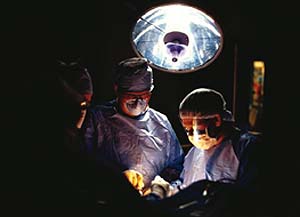
Free healthcare in globally acclaimed hospitals
Selfless Seva
Saturday January 28 2006 17:56 IST
Hiramalini Seshadri

Free healthcare in globally
acclaimed hospitals
Time was when the name Sri Sathya Sai Baba
conjured up the image of a slight orange-clad figure with an Afro hairdo who
performed miracles. Today most Indians view him as a spiritual leader who
inspires harmony between people of all faiths; as an ideal educationist who runs
totally free educational institutions; as a social worker par excellence who has
brought drinking water to the poorest of the poor in Andhra and Karnataka and
even to the metropolis of Chennai; as a healthcare provider who has set up
globally acclaimed hospitals where everything is free; and as one whose devotees
have a passion for “selfless seva”. However, what is amazing is the stupendous
global impact he has had, though he has never stepped out of India except once
in 1968 when he visited Africa. Broadly, the global activities carried out in
the name of Sri Sathya Sai Baba can be divided into Educare, Medicare and
Sociocare.
EDUCARE: Education enables one make a living; while educare enables one attain
the highest in life. Educare helps one realise that one is not separate, but
part of creation, which is in turn part of the Creator; and what is more, so is
one’s neighbour. Baba’s educare programme which began in the sixties in India
through the Bal Vikas project has now reached 180 countries. Three time Thai
parliamentarian and ex-NASA scientist, Dr. ART-ong Jumsai, is a pioneer who has
dedicated his life to educare; and thanks to Dr Jumsai and likeminded devotees,
today there are Institutes of Sathya Sai Education (ISSE) in all continents. The
Institutes train teachers in Educare and carry out research on the impact of
Sathya Sai Education in the world. There are 52 Sathya Sai schools globally.
MEDICARE: Sai Centres abroad have been running many free clinics and medical
camps for over two decades. A coordinated medicare programme has been launched
recently under the auspices of the Sai International Medical Committee to reach
Sai Ideal Health Care everywhere. The activities include Ongoing Healthcare
Delivery, Disaster Relief, Medical Camps and Health Care Services, Disease
Prevention and Health Education. In the Far East, Africa, Latin America and
South Asia, in partnership with private hospitals, which offer free theatre and
ward services, regular medical and surgical services have been available for the
needy. An ideal hospice for the terminally ill is functioning in Sri Lanka.
In a major step forward, Sai Organisations are also tying up with governments in
the implementation of National Health Programmes; for example, in Kenya the Sai
Organisation distributes insecticide-treated mosquito nets to populations at
risk of malaria no matter how remote and inaccessible the terrain; and this
unique Sai Net programme has generated global interest. In the USA and other
developed nations, Sai Medicare targets those who are not insured and have no
access to healthcare. In appreciation, the Mayor of St Louis, proclaimed the
11th of September as ‘Sri Sathya Sai Baba Day’, last year.
SOCIOCARE: Sociocare programmes done by Sai Organisations in various nations are
just too many to enumerate. However the water management project being
implemented by the African Institute of Sathya Sai Education (TAISSE) merits
mention. The Experts Group Meeting of water experts convened in 2001 by the
UN-Habitat, the United Nations Environment Programme (UNEP) and the Sweden
International Water Institute at Johannesburg was taken up by the Human Values
approach to water management suggested by Victor Kanu of TAISSE. In fact, TAISSE
was contracted by UN-Habitat to implement Value Based Water Education in six
African countries. Water education is a combination of water literacy —
knowledge about water sources, and, Value Based Perception — where water is
viewed as a precious resource to be used responsibly for the the greater common
good. Waterbodies are viewed as gifts given in trust to us to be safeguarded and
passed down to future generations who are to inherit the earth after our time.
By 2004, the project was completed so successfully that UN-Habitat has now
requested TAISSE to implement a Value Based Water, Sanitation and Hygiene
Education in 12 African countries. Taking a leaf out of Baba’s Anantapur Water
Project, devotees at Ndola, Zambia, have also started a small water project.
Thanks to it, five poor townships and water-starved for centuries, have potable
water today.
Latin America is another region where powerful Sai sociocare projects are on.
The Director of a prison at Sensuntepeque, El Salvador, was so touched by the
Sai Study Circle meetings in the prison, that he volunteered to do the Sathya
Sai Human Values Diploma Course. In Beunos Aires, an ideal home for street
children exists with a typical Sai twist to the tale. They used to live in a
makeshift cramped place. While gardening one day, the kids found 12 kilos of
pure gold in a flowerpot. Their street instincts told them to go for the gold
and run away; but after all the EHV they had been taught, they simply could not.
They notified the elders who notified the police and finally the courts declared
that the gold belonged to the boys. With that money, a lovely home was built.
What is absolutely amazing is this: most volunteers participating in the Sai
educare, medicare or sociocare projects abroad have not even seen Baba; but they
are all full of love for this gentle eighty-year-old who lives in India, whom
they refer to as the Avatar of the age. What is more, they are able to sense and
feel his love for them across oceans and continents; and they are transmuted as
it were. Of all the wondrous things Sri Sathya Sai Baba has created over the
years, this transformation of hearts the world over remains his greatest
miracle.
Copyright Express Network Private Ltd.
Source: Newindpress on Sunday - India
http://www.newindpress.com/sunday/sundayitems.asp?id=SE120060128083027&eTitle=Development&rLink=0